“Hello, Yamamoto-san? I have an idea for next year’s NoitaminA block.”
“Oh? Let’s hear it.”
“Well – it’s based on a book. And it’s already been an award-winning movie.”
“Wow – sounds great. What’s it about?”
“It’s a thriller about compiling a dictionary. It’s- Hello? Are you still there?”
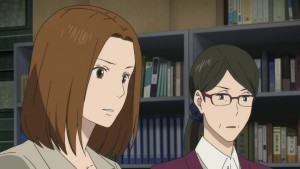 The new NoitaminA announcements came out today, taking us through the beginning of 2018. And it pretty much confirms that they’ve packed it in on the whole “expand the audience and take risks” thing. First we havre the Kaji Yuuki star vehicle “It’s Nothing Like Free!, Stop Saying That”, followed by “That Seinen Nobody Thinks is Actually That Good.” Finally it’s “Season 2 of the Zombie Show That Never Should Have Been on NoitaminA and Made No Sense, But Was Popular”. It seems a fitting exclamation point on the death sentence for 2017 in anime.
The new NoitaminA announcements came out today, taking us through the beginning of 2018. And it pretty much confirms that they’ve packed it in on the whole “expand the audience and take risks” thing. First we havre the Kaji Yuuki star vehicle “It’s Nothing Like Free!, Stop Saying That”, followed by “That Seinen Nobody Thinks is Actually That Good.” Finally it’s “Season 2 of the Zombie Show That Never Should Have Been on NoitaminA and Made No Sense, But Was Popular”. It seems a fitting exclamation point on the death sentence for 2017 in anime.
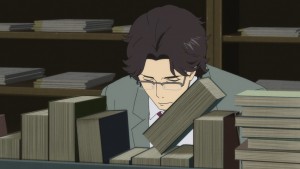 The thing is, if Fune wo Amu is indeed the last hurrah of the old, “art for art’s sake” NoitaminA, at least they picked a perversely uncommercial lead balloon to go out on. If you’d told me you could make a genuinely exciting series about compiling a dictionary, I’d have said you were crazy. I’m vastly more geeky and esoteric than 90% of the population, I’d bet, and I find dictionaries pretty boring. For most people (even those that love books) dictionaries are things we take for granted almost as much as air. Yeah we need them sometimes (even if they’re now mostly online) but why would we ever want to think about them?
The thing is, if Fune wo Amu is indeed the last hurrah of the old, “art for art’s sake” NoitaminA, at least they picked a perversely uncommercial lead balloon to go out on. If you’d told me you could make a genuinely exciting series about compiling a dictionary, I’d have said you were crazy. I’m vastly more geeky and esoteric than 90% of the population, I’d bet, and I find dictionaries pretty boring. For most people (even those that love books) dictionaries are things we take for granted almost as much as air. Yeah we need them sometimes (even if they’re now mostly online) but why would we ever want to think about them?
Who’d have thought two of the shows I’d be most vested in this season would be about dictionary writing and figure skating? God bless writers (and producers) who take chances.
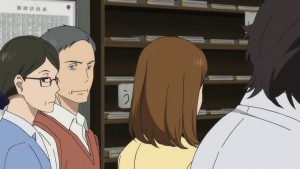 It’s not really a surprise that The Great Passage would be going over rather wistful and emotional as we reach the endgame, but what is surprising is that it’s also become genuinely suspenseful. This has become a race against the clock, of course – Matsumoto-sensei is clearly running out of time (the hints have not been subtle) and the disaster of the missing word is a huge setback for the process. Majime decides that the entire 4th revision has to start over, which means every word has to be cross-checked to make sure it’s present. And that means hiring a team of young temps to do marathon sessions helping out (did Genbu really pony up the dough for that?).
It’s not really a surprise that The Great Passage would be going over rather wistful and emotional as we reach the endgame, but what is surprising is that it’s also become genuinely suspenseful. This has become a race against the clock, of course – Matsumoto-sensei is clearly running out of time (the hints have not been subtle) and the disaster of the missing word is a huge setback for the process. Majime decides that the entire 4th revision has to start over, which means every word has to be cross-checked to make sure it’s present. And that means hiring a team of young temps to do marathon sessions helping out (did Genbu really pony up the dough for that?).
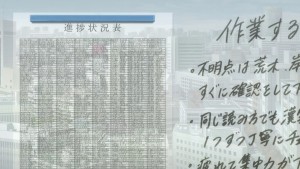 As with so much of the dictionary process, Fune wo Amu really makes one stop and think about things that never crossed the mind before (like why drawings are better for dictionaries than photographs). A missing word – when you do think about it, for a dictionary writer that’s an epic disaster. What happens to your credibility if you go to print missing a word (and someone will surely notice sooner or later)? Not knowing how it happened, you’d have no choice what to do what Majime did here, because you can’t rule out some systematic flaw in the process that might have led to other omissions. It’s a catastrophe under any circumstances – but under these…
As with so much of the dictionary process, Fune wo Amu really makes one stop and think about things that never crossed the mind before (like why drawings are better for dictionaries than photographs). A missing word – when you do think about it, for a dictionary writer that’s an epic disaster. What happens to your credibility if you go to print missing a word (and someone will surely notice sooner or later)? Not knowing how it happened, you’d have no choice what to do what Majime did here, because you can’t rule out some systematic flaw in the process that might have led to other omissions. It’s a catastrophe under any circumstances – but under these…
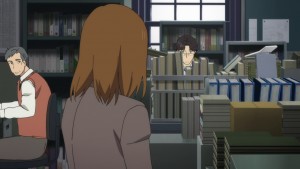 Things have gone from bad to worse with Matsumoto, who’s hospitalized just when the arduous cross-checking marathon has begun. As Majime says, he wouldn’t be surprised if Matsumoto was 90 years old – or 68. Whatever age he is he’s running down, and it’s very much a dicey proposition whether he’s going to live to see “The Great Passage” come to fruition. This is a labor of love for him, but not just that – it’s his labor of love. He was the one who brought these people together, and to a very real extent it’s their love for him that’s driven them to work so hard to try and get the book published as quickly as possible.
Things have gone from bad to worse with Matsumoto, who’s hospitalized just when the arduous cross-checking marathon has begun. As Majime says, he wouldn’t be surprised if Matsumoto was 90 years old – or 68. Whatever age he is he’s running down, and it’s very much a dicey proposition whether he’s going to live to see “The Great Passage” come to fruition. This is a labor of love for him, but not just that – it’s his labor of love. He was the one who brought these people together, and to a very real extent it’s their love for him that’s driven them to work so hard to try and get the book published as quickly as possible.
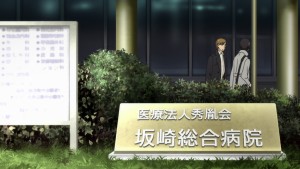 There are lots of really nice little touches in this episode. I loved the way the passion of the team rubbed off on the bewildered and exhausted Millennials drafted to save the day, and the tie-in of the dictionary omakes to the story (the little blue one, Kai, turns out to be the mascot Nishioka creates for “The Great Passage”), and the nautical design of the book jacket. I also really enjoyed the quiet little scenes with Majime and Kaguya, (might she be pregnant?) which shows both the sacrifices Majime is making for this project, and the understanding nature of his wife in realizing its importance to him. And the post-ED photo shoot with Obaa-san and the original Tora was a sweet and sad touch, too. The Great Passage has done an awful lot of things right, and in a sense, I’ll be seeing NoitaminA sailing off into the sunset right with it when this series ends.
There are lots of really nice little touches in this episode. I loved the way the passion of the team rubbed off on the bewildered and exhausted Millennials drafted to save the day, and the tie-in of the dictionary omakes to the story (the little blue one, Kai, turns out to be the mascot Nishioka creates for “The Great Passage”), and the nautical design of the book jacket. I also really enjoyed the quiet little scenes with Majime and Kaguya, (might she be pregnant?) which shows both the sacrifices Majime is making for this project, and the understanding nature of his wife in realizing its importance to him. And the post-ED photo shoot with Obaa-san and the original Tora was a sweet and sad touch, too. The Great Passage has done an awful lot of things right, and in a sense, I’ll be seeing NoitaminA sailing off into the sunset right with it when this series ends.



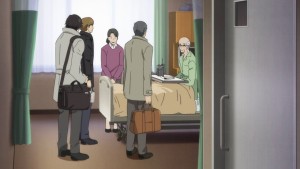
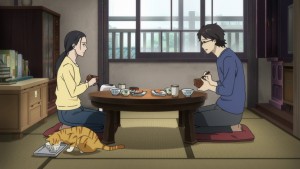
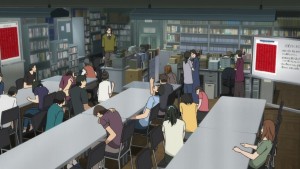
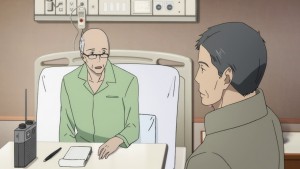
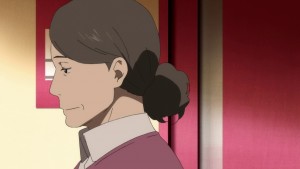
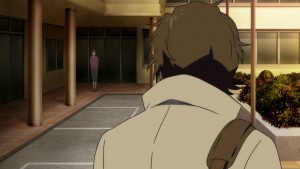

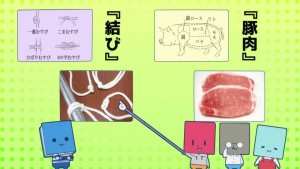

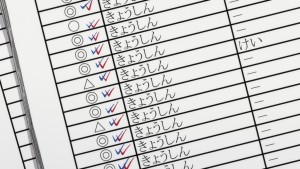
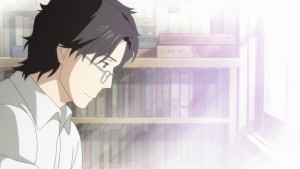
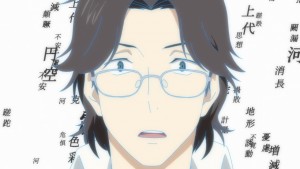
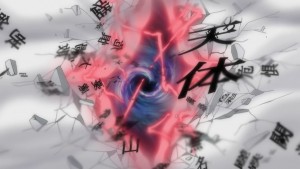
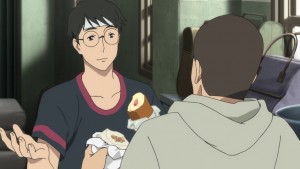
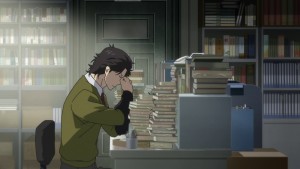
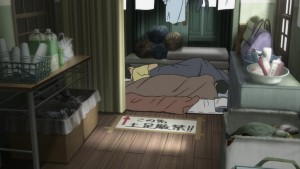
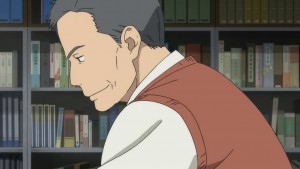
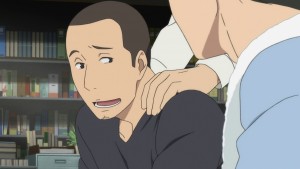
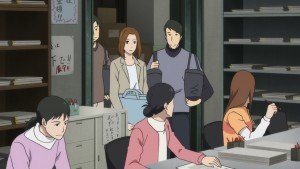
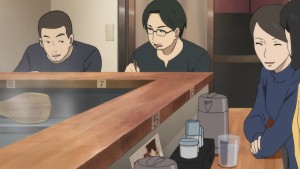

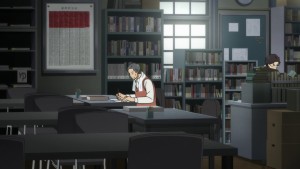
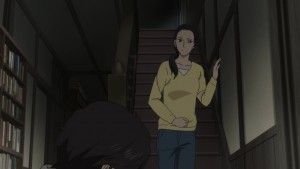
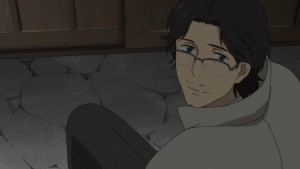
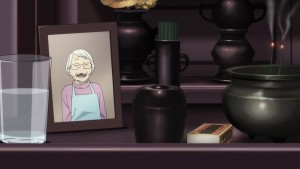
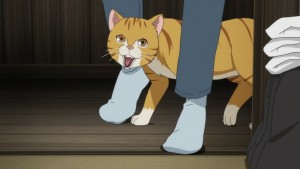
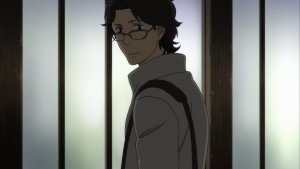
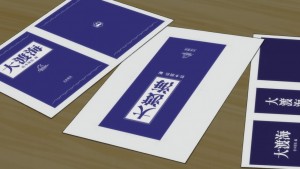
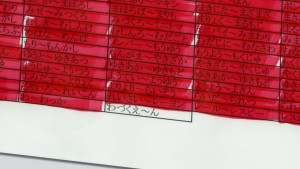
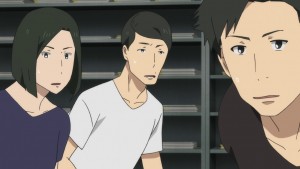
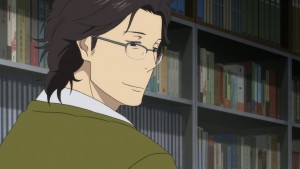
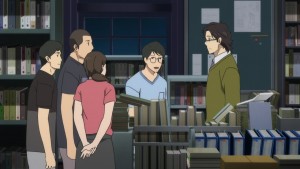
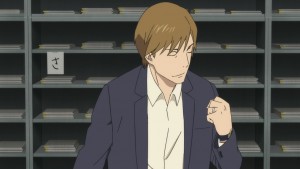
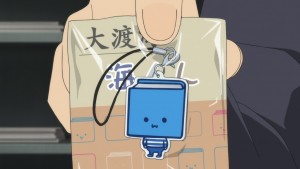
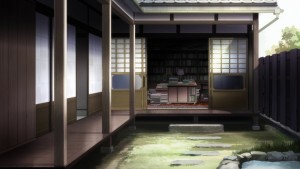
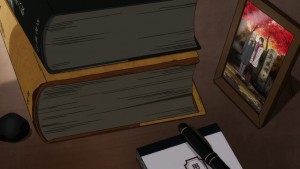
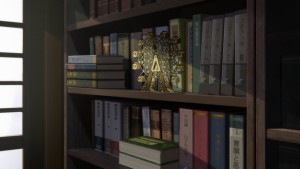
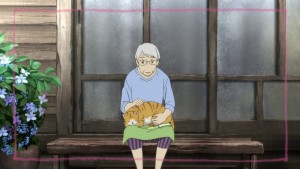
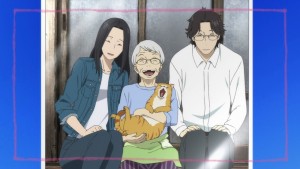
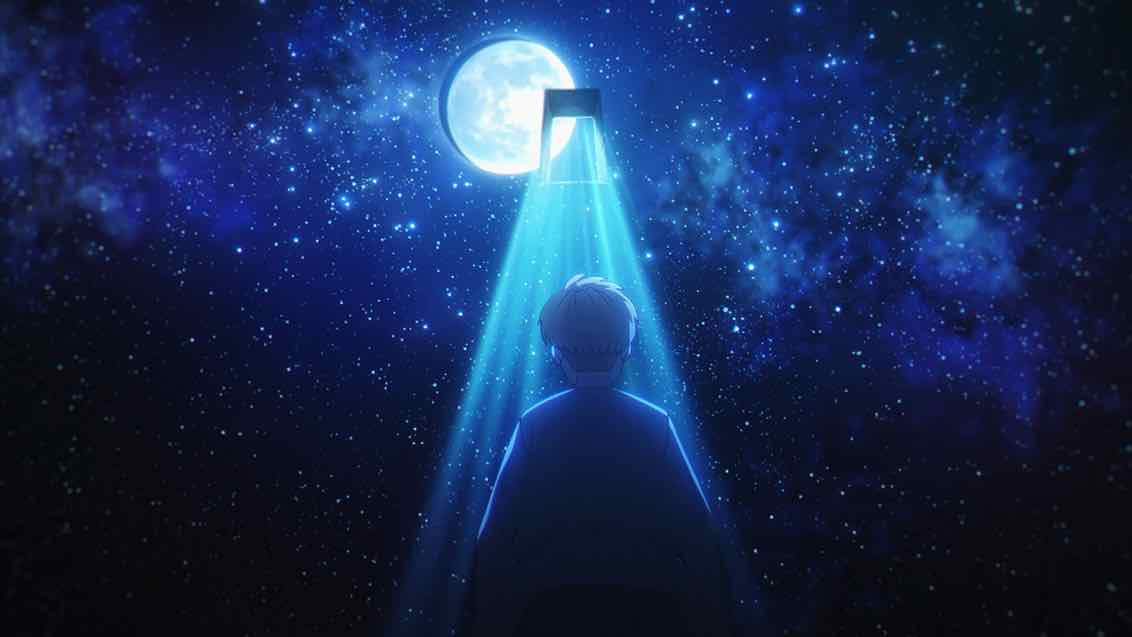

Thumpthump
December 15, 2016 at 10:50 pmI still don’t understand why Kabaneri is part of NoitaminA. Also need to catch up to this on episode 7 and seems like I’m missing out on alot.
Bel
December 16, 2016 at 10:15 amThe 2017 NoitaminA lineup is lacklustre to say the least. They have basically taken out just about everything that made this programming block special in the first place. At least there is the anime film adaptation of Morimi Tomihiko’s “Yoru wa Mijikashi Arukeyo Otome” to look forward to, and Yuasa Masaaki is directing.
Guardian Enzo
December 16, 2016 at 10:22 amAnd doing some sort of TV project in the Spring, seemingly.
saras
December 17, 2016 at 8:06 amNot cool, Noitamina, not cool!!! `3`
That aside, I loved the episode this week. It was over something most people would think is trivial but it felt tense all the way through, especially the visual of a whirlwind/black hole sweeping all the words away. But in the end the characters are what always sells it to me–everyone is very dedicated humble, and hardworking. And as you’ve pointed out that spirit rubbed off on the temps. Go team!
As much as I love the whole show, I’m a bit sad that we missed developments that would’ve been interesting within that time skip, that’s my only complaint :/
Still worried about Matsumoto-sensei, though…but what is his secret to looking so young? Doctors wanna know! Hopefully he’ll be okay at least until the dictionary gets published. I’m already sold on that Kai-kun keychain…
Problemo
December 17, 2016 at 9:59 amThere’s one thing that’s been bothering me about this show and the latest episode made this problem very explicit. I find it very hard to believe that even in Japan with its sometimes slow-moving traditional approach, dictionary compilation work would still be done by hand in the year 2014. (Frankly, this would apply even to 2000-2001 when the show’s timeline started.)
The book this anime is based on started serialization in late 2009. In early 2009, I bought my one and only Japanese paper dictionary – the Koujien – which has been sitting on a shelf ever since, never actually used. That’s because since long before 2009, I’d been using electronic dictionaries and there’s really no benefit in using a heavy paper book instead. Certainly by 2009, typesetting of printed books had also shifted onto computers, not to mention by 2014. I don’t know what the time frame was in the novel – possibly around the 1980-90s when this lack of computerization might have been more plausible.
While I can understand how a even in case of an electronic manuscript the printout version would still be checked, I honestly don’t see why it should ever have to be checked for missing words as such. Clearly the word lists themselves would have to have been entered into a computer at some point, so it would simply be a matter of creating and running a script comparing these lists with the master electronic copy of the manuscript that went into print. This would take a single programmer no more than a few days, not an inordinate amount of time by an army of manual laborers. Since a lot has been made of the company brass not exactly being in love with Daitokai, I don’t see how they’d ever go for such an extravagant waste of resources, especially when it wouldn’t actually be necessary.
I get that the point of this story is (among other things) to evoke nostalgia (and it’s doing this quite well), but I’d say it was a mistake to make the chronology so current that it becomes quite hard to suspend disbelief over such issues. Not to mention that they missed the opportunity to show the inevitable technological changes introduced into the work process over the timeskip.
Guardian Enzo
December 17, 2016 at 10:26 amI confess I don’t know enough about the process to know whether your criticism is valid or not. I suspect it is, but even if so, I just chalk it up to the suspension of disbelief element. Remember, this is a department that Matsumoto-sensei set up, and hasn’t really seen any infusion of new blood for 13 years between Majime and Kishibe. There are no techies in the group, and the publishing house seems to treat the department as a red-headed stepchild – they’re exiled to the old building and working on a shoestring budget. Maybe no one ever bothered to force them to modernize?
Problemo
December 17, 2016 at 11:05 amIf they’re working off word list printouts, they must have electronic copies of those files somewhere. Old building or not, the book would certainly be typeset off an electronic manuscript somewhere. These are givens even in the retro setting of the dictionary group.
Yes, it may have been nice to show the dedication and teamwork involved in solving the potentially missing words problem the way they did. But, it wouldn’t have been any worse to show Majime all stressed out over having to do all this manual checking and then have Kishibe or Nishioka suggest that it could probably all be done on a computer (and throw in some spiffy graphics of word clouds falling in line to show it all happening). I mean, they may not be techies, but they’re certainly not fools or backwater hicks blissfully unaware of modern technology. On a shoestring budget it’d be even less prudent to do the word checking manually, because there’s no way all the man-hours of those temps could cost less than a few days of some IT guy – not to mention a very different impact on the schedule. (If I were vengeful upper management, I’d seriously hurt Majime for this.)
As much as I love this show, I really think they missed the boat (pun intended) on integrating technological advances into the story along with the time shift. And even if I can suspend my disbelief, the problem wouldn’t arise at all if they’d placed all this in an earlier time period. It doesn’t make a lot of sense to have people texting smilies while compiling dictionaries manually.
Guardian Enzo
December 17, 2016 at 11:49 amI don’t think the story would have had as much traction set in an earlier time period. If this group doesn’t seem anachronistic you don’t have a story, really.
Problemo
December 17, 2016 at 12:37 pmI’d say that heavy outward anachronism isn’t all that crucial here, compared to being outsiders with different values, fighting to keep A Very Important Thing alive through changing times. In any case, it’d remedy some of the weirdness to have the story set at least a decade earlier and I doubt it would alter the impact. The original story from 2009 likely didn’t extend into the future, so moving the end times to 2014 seems quite unnecessary.
Simone
January 1, 2017 at 6:50 amYeah, I find the whole thing slightly unbelievable too. And it’s not like, even with automation, this has to be an especially simple job – it just crunches a bit on the tedious parts like typesetting. Plus I suspect even 20 or 30 years ago a bunch of people so passionate about dictionary making would have looked a bit like oddballs to society at large. If the novel draws from personal experience of some sort, the author should have probably set it in a comparable time period.